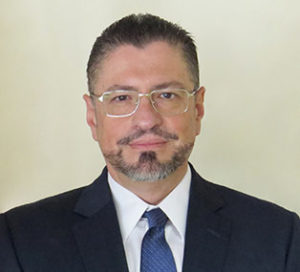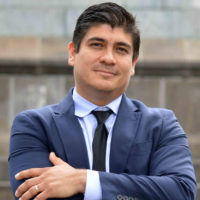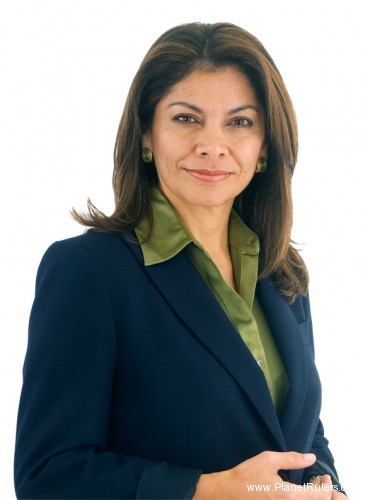Rodrigo Chaves, President of Costa Rica (elected on Apr 4, 2022 with 53% of the vote)
 Rodrigo Alberto de Jesús Chaves Robles (born 10 June 1961) is a Costa Rican economist and politician who is the president-elect of Costa Rica and is due to take office on 8 May 2022. Chaves was previously Minister of Finance during the presidency of Carlos Alvarado Quesada.
Rodrigo Alberto de Jesús Chaves Robles (born 10 June 1961) is a Costa Rican economist and politician who is the president-elect of Costa Rica and is due to take office on 8 May 2022. Chaves was previously Minister of Finance during the presidency of Carlos Alvarado Quesada.
Chaves Robles was born in the metropolitan district of Carmen, in the central canton of San José, on 10 June 1961. He obtained a Ph.D. in Economics from Ohio State University. Before his appointment as minister, he worked as the World Bank country director for Indonesia and countries of America, Europe and Asia.
In 1992, before completing his Ph.D., the Institute for International Development at Harvard University offered him a four-month fellowship to conduct field research on poverty, rural poverty, microenterprise, and medium enterprise in Indonesia. When he finished his doctorate, the World Bank offered him a job for the publication of his research.
Chaves announced that he made the decision to retire as a World Bank official and return to Costa Rica because he considered that if he had requested a leave of absence, there could be a conflict of interest due to the conversations he had to have with that organization as part of his ministerial management. However, in August 2021, when the results of an investigation into allegations of sexual harassment against Chaves were known, it was reported that it could be the reason for his resignation from the World Bank. The World Bank’s administrative tribunal noted that an internal investigation found that from 2008 to 2013, Chaves made unwelcome comments about physical appearance, repeated sexual innuendo and unwelcome sexual advances toward multiple bank employees. Those details were repeated by the bank’s human resources department in a letter to Chaves, but it decided to sanction him for misconduct rather than sexual harassment. Chaves denied all accusations of sexual harassment.
Source: https://en.wikipedia.org/wiki/Rodrigo_Chaves_Robles
Carlos Alvarado Quesada, Former President of Costa Rica (elected on Apr 1, 2018)
 Carlos Alvarado Quesada (San José, January 14, 1980) is a Costa Rican writer, journalist, political scientist and politician and the President-elect of Costa Rica. He previously served as Minister of Labor and Social Security. Alvarado has a Bachelor’s degree in communication and a Master’s degree in political science from the University of Costa Rica, as well as a Master’s degree in development studies from the University of Sussex and is a member of the Citizens’ Action Party.
Carlos Alvarado Quesada (San José, January 14, 1980) is a Costa Rican writer, journalist, political scientist and politician and the President-elect of Costa Rica. He previously served as Minister of Labor and Social Security. Alvarado has a Bachelor’s degree in communication and a Master’s degree in political science from the University of Costa Rica, as well as a Master’s degree in development studies from the University of Sussex and is a member of the Citizens’ Action Party.
He served as an advisor to the Citizen Action Party’s group in the Legislative Assembly of Costa Rica in the 2006-2010 period. He was a consultant to the Institute of Development Studies of the United Kingdom in financing SMEs. Department Manager of Dish Care & Air Care (Procter & Gamble Latin America). Director of Communication for the presidential campaign of Luis Guillermo Solís, professor in the School of Sciences of Collective Communication of the University of Costa Rica and in the School of Journalism Of the Universidad Latina de Costa Rica. During the Solís Rivera administration, served as Minister of Human Development and Social Inclusion and Executive President of the Joint Social Welfare Institute, institution charged with combating poverty and giving state aid to the population of scarce resources. After the resignation as minister of Víctor Morales Mora, Alvarado was appointed minister of Labor.
In this portfolio it was noted for reducing the benefits of state collective agreements of the Bank of Costa Rica, JAPDEVA and RECOPE in successful negotiations with the unions. No previous government had negotiated collective bargaining to the downside. During the management of Alvarado a reduction of the time of seven to two months in the procedures of pensions of the teaching profession was achieved. It also managed to renegotiate the wage formula of the private sector in a unanimous agreement among workers, employers and the government, as well as a tripartite agreement among the same sectors to reduce informality, according to International Labour Organization (ILO) recommendation 204. As minister he also promoted the implementation of laws that cut luxury pensions, as well as the Ministry of Labor’s defense of these laws before the Constitutional Court after appeals filed by several former deputies. Alvarado guaranteed that the Ministry of Labor will have the budget and the new places for the entry into force of the Labor Procedure Reform in July 2017.
In 2006 Quesada published the anthology of stories Transcripciones Infieles with Perro Azul. That same year he obtained the Young Creation Award of Editorial Costa Rica with the novel La historia de Cornelius Brown. In 2012 he published the historical novel Las Posesiones that portrays the dark historical period in Costa Rica during which the government confiscated the properties of Germans and Italians during World War II.
Source: https://en.wikipedia.org/wiki/Carlos_Alvarado_Quesada
 Luis Guillermo Solís, Former President of Costa Rica (since Feb 2, 2014)
Luis Guillermo Solís, Former President of Costa Rica (since Feb 2, 2014)
Luis Guillermo Solís Rivera (born 25 April 1958) is a Costa Rican politician who has been President of Costa Rica since 2014. He is a member of the center-left Citizens’ Action Party (PAC). Solís led the field in the 2014 presidential election, and he was effectively handed the presidency after the runner-up in the first round, San José mayor Johnny Araya Monge, ceased active campaigning. Solís has a long academic and political career, culminating in his election as the first President of Costa Rica to be a member of the PAC.
Solís was born in San José, Costa Rica to Vivienne Rivera Allen, an educator, and Freddy Solís Avendaño, an uneducated shoemaker. Both his parents lived in Turrialba, and as such many residents consider him Turrialban. His family has Afro-Caribbean and Chinese roots, coming from Jamaica to Costa Rica in the early 1900s.Solís grew up in San Pedro de Montes de Oca and Curridabat, neighborhoods of San José. He attended Methodist High School in San José, where he was president of the student body, before studying history at the University of Costa Rica, where he earned a degree with academic honors in 1979. He earned a Masters degree in Latin American Studies at Tulane University in New Orleans.
Solís has held various academic and consulting positions. Between 1981 and 1987, he was an associate professor at the University of Costa Rica. In addition, he was a Fulbright Scholar at the University of Michigan from 1983 to 1985. During this time, Solís worked with the Arias administration and eventually became director of the Center for Peace and Reconciliation (CPR for its Spanish initials). From 1992 to 1995, Solís worked with the Academic Council of the United Nations System. Starting in 1999, Solís worked for Florida International University as coordinator in the Center for the Administration of Justice and as a researcher for the Latin American and Caribbean Center, where he analyzed political and social events in Latin America.
A writer and editorial writer, Solís has published numerous essays and books about national and international affairs. In the 1990s, he wrote for La República, a daily newspaper based in San José. His writing has been published by Foreign Affairs Latinoamérica, Frontera Norte, Espacios and Global Governance. His writing has focused on civil society, international relations, and trade.
Solís is married to Mercedes Peñas. They have six children. Peñas said that she hopes to be active as an adviser to Solís, who called her “Jiminy Cricket.” Saying that some of her duties as First Lady are machista, she will nevertheless greet dignitaries and perform other obligations. In addition to public service and academics, Solís enjoys farming.
Source: http://en.wikipedia.org/wiki/Luis_Guillermo_Sol%C3%ADs
Laura Chinchilla Miranda, Former President of Costa Rica since May 8, 2010
Laura Chinchilla Miranda, current president of Costa Rica. Chinchilla ran from the Partido Liberación Nacional of Costa Rica for the general elections of 2010. Laura Chinchilla was born on March 28, 1959 in San Jose, Costa Rica, the daughter of Rafael Angel Chinchilla Fallas, Comptroller General of the Republic during two administrations (1972-1987) and Emilce Miranda Castillo. Since 2000 she has been married to Jose Maria Rico Cueto and they have a son, José María Rico Chinchilla.
First Vice President of the Republic of Costa Rica and Minister of Justice in the administration of Óscar Arias Sánchez (2006-2010). Although she left office on October 8, 2008, to pursue further her political career and created the Laura Chinchilla campaign for the presidency of Costa Rica with the Partido Liberación Nacional.
Since 1990 she has worked as a consultant in Latin America and Africa for various international agencies in the area of institutional reform, with special emphasis on judicial reform and public security reform. Some consultancy led her to conduct assessments of the justice sector for the U.S. Agency for International Development (USAID), the coordination of studies and projects on judicial reform for the United Nations Program for Development ( UNDP) and assessments and advice on police reform to the Inter-American Development Bank (IDB).
Laura Chinchilla has been a speaker at various international forums on matters of public security and police reform. She has served on various reform initiatives that promote citizen security and human rights throughout Latin America, such as the Project Advisory Committee of Civil Society and Public Safety for the Washington Office on Latin America (WOLA), the Central American Dialogue Foundation Arias for Peace and Human Progress, and the Foundation for Peace and Democracy (FUNPADEM). During this period Laura Chinchilla has published in both Spanish and English – books, monographs and articles on subjects relating to the administration of justice, public security and police reform. Career highlights of Laura include working in the public sector management as Deputy Minister of Public Security (1994 – 1996) and Minister of Public Safety (1996 to 1998). She was also Chairman of the Joint Drug Intelligence Center, Chair of the National Immigration Council, member of the National Drug Council, National Security Council and the Academic Council of the National Police Academy.
In the Costa Rica Legislature, she has worked in areas of judicial reform, public safety (police, drug trafficking, organized crime, etc..) Political and institutional reform (reform of the state and electoral reform), trade, technology, and children and youth programs.
Laura Chinchilla Biography during the last administration
After a bitter campaign, Laura Chinchilla managed to become vice president with the Partido Liberación Nacional and Oscar Arias Sanchez as the presidential candidate. She and Kevin Casas Zamora remained as first and second vice presidents respectively, and the cabinet was led by Dr. Oscar Arias Sanchez in the post of Minister of Justice. The Second Vice President Kevin Casas Zamora resigned on September 22, 2007 because of ethical questions. Laura Chinchilla campaign for Costa Rica president was born on October 8, 2008 driven by a citizen initiative that has pushed her to becoming the first female president of Costa Rica.
Laura Chinchilla Campaign
On Saturday, 10 October 2008, and after the Supreme Electoral Tribunal formally withdrew her credentials as Vice-President of Costa Rica, Laura Chinchilla announced to the media of her legitimate desire to run for the presidency of Costa Rica, and for her pre-candidacy Partido Liberación Naciona which needed to still vote for a leader of their ticket.
Voting for the ticket in the Partido Liberación Naciona was held on 7 June 2009, and declared Laura a winner by a margin greater than 15%, and was chosen by the Partido Liberación Naciona of Costa Rica to be the official candidate for presidency in 2010. On May 8, 2010, Laura Chinchilla was sworn in as the President of Costa Rica.



